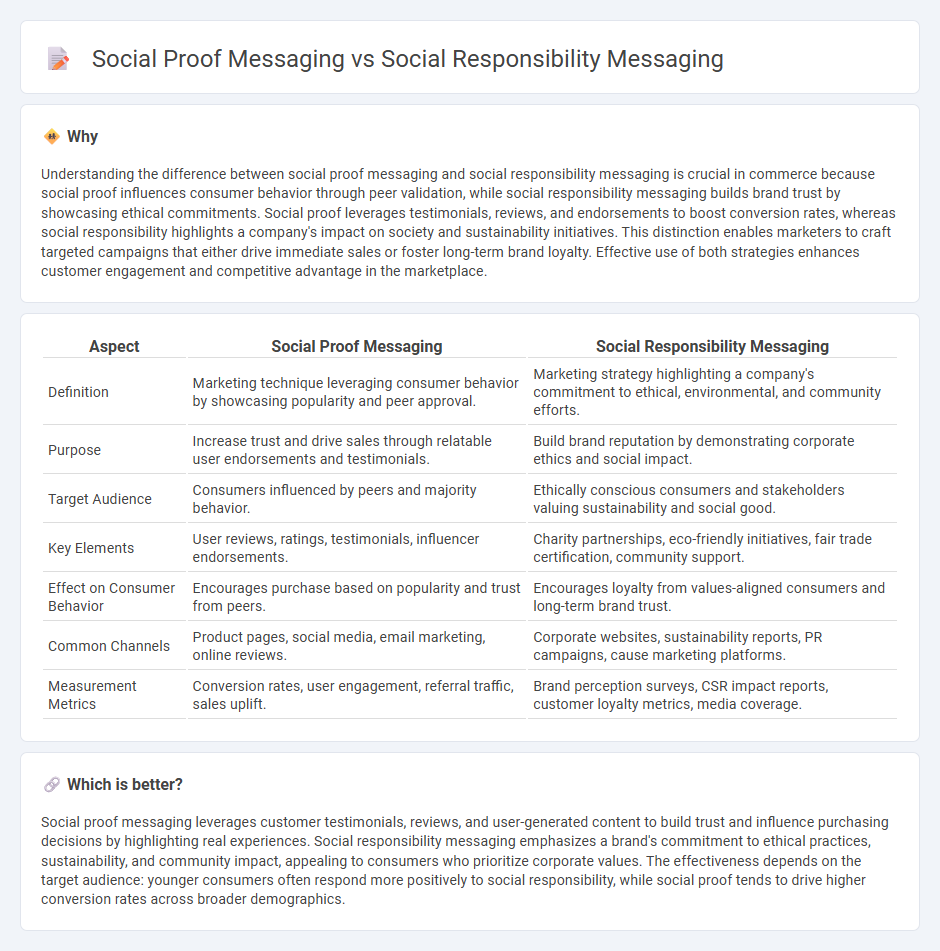
Social proof messaging leverages customer testimonials, reviews, and user-generated content to build trust and influence purchasing decisions by showcasing real experiences and social validation. Social responsibility messaging emphasizes a brand's commitment to ethical practices, sustainability, and community impact, appealing to consumers who prioritize values and corporate accountability. Discover how integrating both strategies can strengthen your brand's connection with today's conscious consumers.
Why it is important
Understanding the difference between social proof messaging and social responsibility messaging is crucial in commerce because social proof influences consumer behavior through peer validation, while social responsibility messaging builds brand trust by showcasing ethical commitments. Social proof leverages testimonials, reviews, and endorsements to boost conversion rates, whereas social responsibility highlights a company's impact on society and sustainability initiatives. This distinction enables marketers to craft targeted campaigns that either drive immediate sales or foster long-term brand loyalty. Effective use of both strategies enhances customer engagement and competitive advantage in the marketplace.
Comparison Table
| Aspect | Social Proof Messaging | Social Responsibility Messaging |
|---|---|---|
| Definition | Marketing technique leveraging consumer behavior by showcasing popularity and peer approval. | Marketing strategy highlighting a company's commitment to ethical, environmental, and community efforts. |
| Purpose | Increase trust and drive sales through relatable user endorsements and testimonials. | Build brand reputation by demonstrating corporate ethics and social impact. |
| Target Audience | Consumers influenced by peers and majority behavior. | Ethically conscious consumers and stakeholders valuing sustainability and social good. |
| Key Elements | User reviews, ratings, testimonials, influencer endorsements. | Charity partnerships, eco-friendly initiatives, fair trade certification, community support. |
| Effect on Consumer Behavior | Encourages purchase based on popularity and trust from peers. | Encourages loyalty from values-aligned consumers and long-term brand trust. |
| Common Channels | Product pages, social media, email marketing, online reviews. | Corporate websites, sustainability reports, PR campaigns, cause marketing platforms. |
| Measurement Metrics | Conversion rates, user engagement, referral traffic, sales uplift. | Brand perception surveys, CSR impact reports, customer loyalty metrics, media coverage. |
Which is better?
Social proof messaging leverages customer testimonials, reviews, and user-generated content to build trust and influence purchasing decisions by highlighting real experiences. Social responsibility messaging emphasizes a brand's commitment to ethical practices, sustainability, and community impact, appealing to consumers who prioritize corporate values. The effectiveness depends on the target audience: younger consumers often respond more positively to social responsibility, while social proof tends to drive higher conversion rates across broader demographics.
Connection
Social proof messaging leverages consumer behaviors and testimonials to build trust, while social responsibility messaging highlights ethical practices and community impact to enhance brand credibility. Both strategies influence purchasing decisions by aligning brand values with consumer expectations, fostering loyalty and positive reputation. Integrating social proof with social responsibility creates a powerful narrative that drives engagement and supports sustainable commerce growth.
Key Terms
Brand Trust
Social responsibility messaging emphasizes a brand's commitment to ethical practices, sustainability, and community impact, which fosters long-term brand trust by demonstrating genuine care and accountability. Social proof messaging leverages customer testimonials, reviews, and endorsements to build trust through perceived popularity and validation by others. Explore how combining both strategies can enhance your brand's credibility and consumer confidence.
Consumer Behavior
Social responsibility messaging leverages consumers' values and ethics by highlighting a brand's commitment to societal or environmental causes, which can foster loyalty and positive brand perception. Social proof messaging emphasizes social validation, demonstrating widespread approval or usage through reviews, testimonials, or influencer endorsements, influencing consumer decisions by reducing perceived risk. Explore deeper insights into how these messaging strategies shape consumer behavior and drive purchasing decisions.
Persuasion
Social responsibility messaging leverages ethical appeal by highlighting a brand's commitment to societal and environmental causes, fostering trust and alignment with consumer values. Social proof messaging utilizes testimonials, reviews, and endorsements to demonstrate widespread acceptance and credibility, thereby reducing uncertainty and increasing persuasion effectiveness. Explore deeper insights into how these distinct strategies influence consumer behavior and drive engagement.
Source and External Links
Communicating Corporate Social Responsibility (CSR) with ... - Effective social responsibility messaging involves creating engaging, compelling, and memorable content that boldly communicates a company's commitment to addressing social, economic, and environmental issues, which can enhance customer loyalty, revenue, media exposure, and employee satisfaction.
Message Framing in CSR Advertising on Social Media during the ... - Social media platforms are major channels for CSR messaging, allowing firms to interact directly and timely with consumers at low cost, with messages delivered via these low-control channels being more trusted by consumers.
A Marketing Perspective on Corporate Social Responsibility - Key approaches to social responsibility messaging include cause-related marketing, promoting eco-friendly practices, employee volunteer programs, and sharing CSR stories via social media and content marketing aligned authentically with company values.
 dowidth.com
dowidth.com